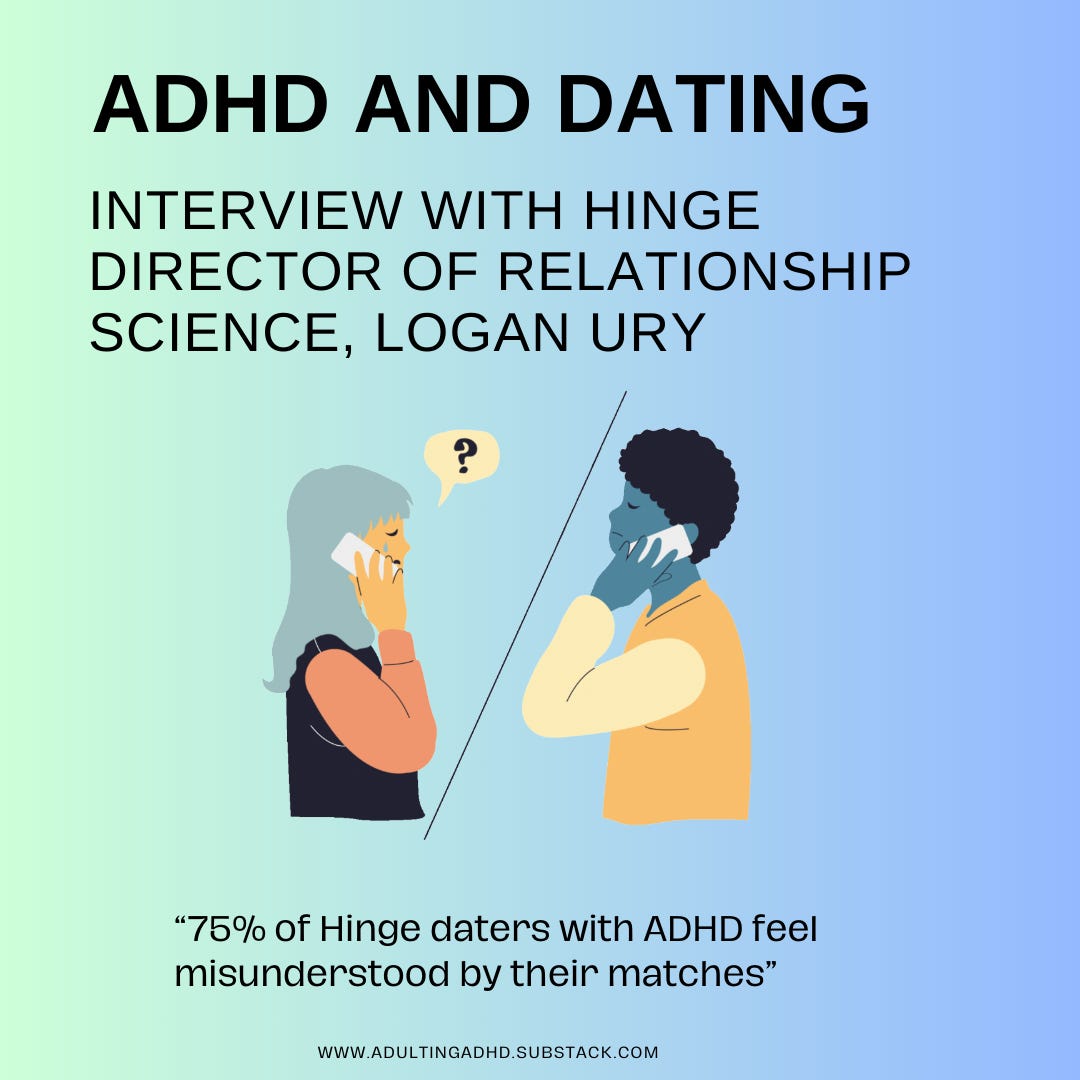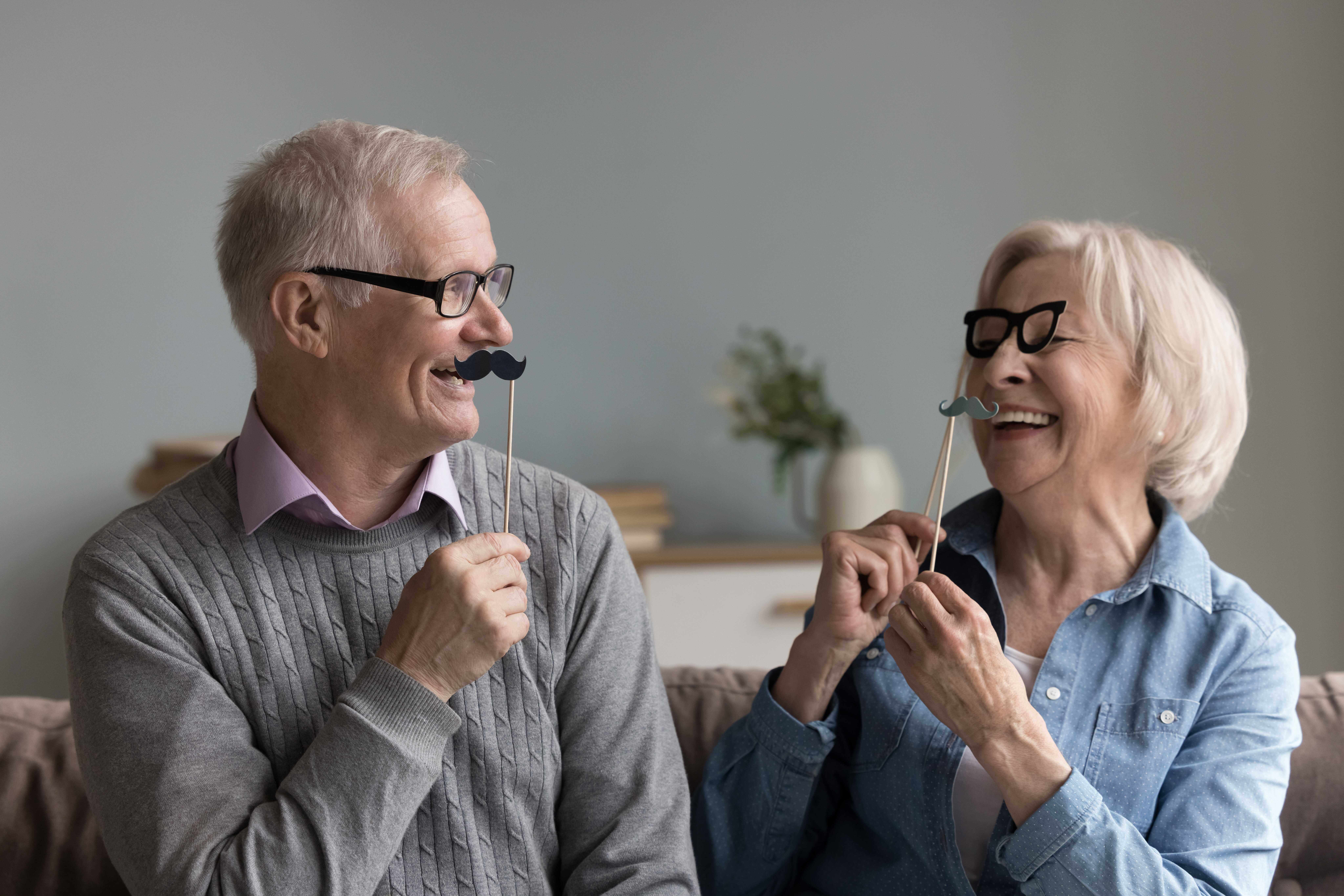What Is The Hardest Thing About Adhd And Dating? I Ask Hinge's Director Of Relationship Science, Logan Ury

Hi ADHDers!
What does everyone think about dating apps?
Do you love it, hate it, enjoy the thrill or dread conversation?
Well whatever bucket you fall in, you have to admit that dating with ADHD is not smooth sailing.
“75% of Hinge daters with ADHD feel misunderstood by their matches” - Hinge’s Love and ADHD D.A.T.E. report
I interviewed Logan Ury, the Director of Relationship Science at Hinge (dating app) and touched on:
Neurotypical Dating vs ADHD Dating challenges
Dating tips for people with ADHD
Hinge’s report on Love and ADHD
Shall we begin?
IN CONVERSATION WITH LOGAN URY, DIRECTOR OF RELATIONSHIP SCIENCE AT HINGE
Rach: Thank you for speaking to me about Hinge’s ‘Love and ADHD D.A.T.E.’ report. Can you share a little bit about the work you do at Hinge as the Director of Relationship Science?
Logan: As the Director of Relationship Science at Hinge, I help people become better daters so they find love and delete the app. I turn insights from behavioral and relationship science into practical, accessible advice that helps people on their dating journey.
Hinge is the only dating app with a dedicated team of PhD and behavioral scientists, Hinge Labs. The Hinge Labs team is focused on providing evidence-based insights, through research on the behaviors and attitudes of successful daters. After uncovering what works, our team takes these learnings and applies them to improve the app for all users.
Hinge’s Tips for Neurotypical daters: “If you assume that a slow response time means a lack of interest, you might be missing out on great potential matches.”
Rach: What inspired Hinge’s report on Love and ADHD?
Logan: At Hinge, we are constantly working to make the app better for all users, with a focus on getting them onto in-person dates. During a research project last year, we heard from many users that their ADHD diagnosis made dating more challenging. This inspired us to take a deeper look at the unique challenges faced by this community.
With support from Disability:IN, a leading nonprofit for disability inclusion, we launched a comprehensive study of over 60,000 Hinge users, including 9,000 daters with a clinical ADHD diagnosis. We specifically focused on two big communication challenges: responding to potential dates and navigating small talk.
Rach: Did anything in the report surprise you about daters with ADHD?
Logan: What really stood out to us was what we call 'Misunderstood Matches'. Our data shows that 3 in 4 Hinge daters with ADHD feel misunderstood by people they're talking to on the app.
Here's what's happening: 71% of daters expect a response within 24 hours, but 45% of Hinge daters with ADHD say they often forget to respond to messages.
That's why we're encouraging daters with ADHD to be upfront about their communication style from the start and neurotypical daters to take a more empathetic approach.
Rach: Since 45% of people with ADHD forget to respond to their matches, are there any plans to introduce new features or tools in the Hinge app to address this?
Logan: On Hinge, we have 'Your Turn,’ which prompts users to start a conversation and reminds them when it's their turn to reply.
Additionally, we recently launched a new feature called Your Turn Limits. With Your Turn Limits, daters who have hit the limit of people waiting for their response need to either respond or close out conversations before matching with someone new. For daters with ADHD, this presents a major benefit as they can hone in more on building a connection with the matches they have.
I’m personally very excited about Your Turn Limits because, as a dating coach, I’ve always encouraged my clients to focus on fewer matches at a time. Too many matches can lead to accidental ghosting and can leave daters feeling overwhelmed. I’m hopeful that daters with ADHD will particularly benefit from Your Turn Limits as they navigate their dating journey.
We’re excited to continue to explore updates that help all daters get off the app and out on great dates.
Rach: The report includes useful tips for daters with ADHD such as ‘being upfront from the beginning about your communication preferences’. What advice would you give to a dater with ADHD who wants to do this, but they worry about being too upfront?
Logan: Being upfront about communication preferences helps avoid those crossed wires that can derail a potential connection.
This doesn’t mean you need to disclose your diagnosis or get overly serious too soon. Instead, this might look like saying to your match “Hey, I’m excited to keep chatting, but I’m not the best texter. Do you want to talk on the phone tonight or meet up for a drink?” This helps express your enthusiasm and lets the other person know that a delayed response doesn't mean you’re not interested.
Rach: As someone with ADHD who has used Hinge, I find that there can be a gamification element of constantly swiping and stacking up matches like they are collectables. Have you noticed such patterns in some users and if so, is this something Hinge seeks to address?
Logan: At Hinge, our app is intentionally designed with one goal — to help daters connect and get out on great dates. To match, daters like or comment on individual photos or Prompts (icebreaker questions to show who you are) on a potential match’s profile — initiating a personal conversation right from the beginning.
We want daters to reduce the time spent on the app and maximize time in person, which is why we launched Your Turn Limits. It’s our ambitious effort to help improve communication on the app so people can focus on the quality over the quantity of their matches.
Rach: I appreciate the work that has gone into the report and I’m sure it’ll help many daters with ADHD, and I hope it raises awareness about ADHD and Dating. What is Hinge hoping to achieve with the publication of the report?
Logan: At Hinge, we’re on a mission to create a less lonely world by inspiring intimate, in-person connections. Our D.A.T.E. reports are designed to provide our community with research-backed resources to help them on their dating journey. By focusing on the specific challenges faced by daters with ADHD, we aspire to foster a dating environment that is more inclusive and understanding, ultimately resulting in more meaningful in-person connections and fewer misunderstood matches.
Did any of these challenges ring a bell?
You can read the full Hinge report ‘Love and ADHD D.A.T.E’ here.
Rach, with ADHD.


